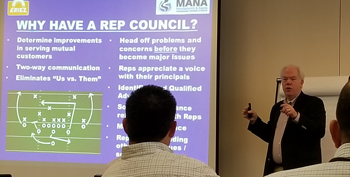
© ashva73 | stock.adobe.com
It’s a question I hear all too often.*
“I’m the sales manager for a manufacturer, and my boss thinks our rep is getting too rich off a new order. I don’t know for sure whether I agree with my boss or not,” said the sales manager.
“I can see the argument that the rep should be rewarded for bringing in a huge order that took five years to close, but the rep’s check last month was bigger than my boss’ check — that is not sitting too well.”
My reply?
The sales manager made the most obvious argument himself. The rep worked for five years before any commission was earned. Now the rep is being compensated for the five years of unpaid work leading up to the order he or she earned for your company. Each commission payment the rep receives covers both payment for that month’s shipments and an installment payment toward reimbursing the rep for all the unpaid work during the past five years.
But there is more to it than that. It will be easier to explain if I use an example.
Let’s say you invested in 50 risky stocks five years ago. Most of the companies went out of business. Some of them earned you a modest profit, and one of them was a big winner.
What was your five-year profit?
Is the gain on the big winner your five-year profit? Of course not. You calculate your net profit by totaling all your losses and all your gains.
Consider that the rep had many losses on prospects in which he or she invested time and effort that never returned a cent of commission.
These losses, which are an expected and normal part of being in the rep business, come from pursuing prospects where the rep’s principal ultimately can’t meet the prospects’ price, delivery, or performance standards.
Reps don’t expect their principals to be an ideal fit for every prospect. Quite the contrary. They expect that only a modest percentage of prospects will be a good fit for their principals and use the commission from the orders they do receive to offset the cost of making calls on prospects that turn out not to be good candidates for their principals’ products.
“Pursuing five to eight prospects for each order that eventually closes is part of the rep business,” explained one rep. “I came into this business with my eyes open. But when I do make a big win, I have to be sure to remind my principals that the commission I receive on each closed order has to cover my cost pursuing that order, and five to eight that didn’t close.”
* This article combines conversations with a number of MANA members. Their comments have been edited for clarity and brevity.





